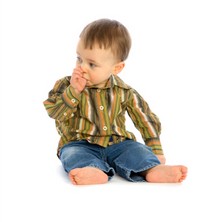- Pediatric Dentist
- Diet / snacks
- Mouthguards
- Prevention
- Emergency tips
- Infants Toddlers
- Adolescents
- Our Practice
FAQs: Infants and Toddlers Dental Care
- What is the importance of Primary Teeth?
- What is Early Childhood Caries (Baby Bottle Tooth Decay)?
- How can I prevent Bottled tooth decay?
- When should bottle-feeding be stopped?
- Should I worry about thumb and finger sucking?
- When should I start cleaning my infant's teeth?
- Do you have any advice on sore gums associated with baby teething?
- What is the normal progression of teeth development in children?
Answers on Infants and Toddlers Dental Care
-
What is the importance of Primary (Baby) Teeth?
Many parents falsely assume that primary (baby) teeth are not important since they will eventually be lost and be replaced by permanent secondary (adult) teeth. However while primary (baby) teeth will eventually all be lost by adolescence, it is very important that primary teeth be kept healthy and in place until they are lost naturally.
Primary teeth serve a number of critical functions, including helping your child maintain good nutrition, permitting your child to chew properly, facilitating proper speech development, and framing appropriate space for proper development of subsequent permanent teeth.
In summary, besides helping your child to feel good and confident about themselves growing up, a healthy set of primary teeth also serves as a foundation for good long-term oral health. (Back to top)
-
What is Early Childhood Caries (Baby Bottle Tooth Decay)?
"Bottled tooth decay" refers to tooth decay or dental cavities that result from consuming sugary or acidic beverages, particularly those that come in bottles or cans, such as soda, energy drinks, fruit juices, and sports drinks. These drinks often contain high levels of sugar or acids.
"Bottled tooth decay" is also sometimes referred to as Bottled Early childhood caries (ECC) or "Baby bottle tooth decay" (BBTD). It is a preventable, infectious disease in children. Caries (or cavities) arise this early in a child's life when children hold food (such as juice and milk) for long periods of time in their mouth or when they go to sleep feeding off a bottle. Bacteria in your child's mouth digest the carbohydrate and food particles in the mouth, producing acids that attack the teeth. Prolonged and frequent exposures to these acids result in cavities and tooth decay. (Back to top)
-
How can I prevent Bottled tooth decay?
In general, encourage your child to drink from a cup instead of sipping as they approach their first birthday. Also, try to discourage your child from drinking or falling asleep with a bottle. After the first primary (baby) teeth begins to erupt, try to avoid all at-will nighttime breast-feeding.
Some of the strategies for addressing bottled tooth decay and embarking on good oral health include:
- Limit Sugary and Acidic Drinks: Cut down on sugary drinks, including fruit juices, soda, and sports drinks.
- Practice Good Oral Hygiene: Brush and floss daily.
- Visit Your Pediatric Dentist: Regular check-ups catch issues early.
- Consider Fluoride Treatments: Strengthen enamel with fluoride.
- Balanced Diet: Eat nutritious foods, minimize sugary snacks.
- Chew Sugar-Free Gum: Stimulate saliva to neutralize acids.
- Use Dental Sealants: Protect teeth from decay, especially molars.
-
When should bottle-feeding be stopped?
Children should be weaned from the bottle at 12-14 months of age. (Back to top)
-
Should I worry about thumb and finger sucking?
Prolonged thumb and finger sucking can create crowded, crooked teeth and bite problems. Nevertheless, thumb and finger sucking is perfectly normal for infants. Most toddlers stop the activities by age 2. If your child does not, you can try to discourage the thumb sucking habit after age 4. Below are some tips you may try.
- Praise and encourage positive behavior.
- Identify triggers and address underlying causes.
- Offer distractions or alternative activities.
- Gentle reminders to stop thumb sucking.
- Limit access to the thumb.
- Encourage interaction with non-thumb sucking peers.
Talk to your pediatric dentist if you need more help. Your dentist will be glad to discuss in further detail and suggest specific ways to address prolonged thumb sucking habits. (Back to top)
-
When should I start cleaning my infant's teeth?
The sooner the better! Starting at birth, clean your child’s gums with a soft infant toothbrush and water. Continue to help along as your child grows: most small children do not have the dexterity to brush their teeth effectively. Unless advised by your child’s pediatric dentist otherwise, do not use fluoridated toothpaste until age 2-3. (Back to top)
-
Do you have any advice on sore gums associated with baby teething?
From six months to age three, your child may have sore gums as their teeth erupt. This is normal. During this sensitive period, your children may be satisfied by being allowed to chew on clean teething rings, cool spoons, and/or cold wet washcloths. You may also use a clean finger to gently rub the sore areas. (Back to top)
-
What is the normal progression of teeth development in children?
Here are two charts from the American Dental Association (ADA) showing normal progression of teeth development:
- Eruption Chart for Primary Teeth (Children's Teeth)
- Eruption Chart for Permanent Teeth (Adult Teeth)
You can find helpful tooth eruption charts on our forms page. (Back to top)
THE INFORMATION CONTAINED IN THESE PAGES DO NOT CONSTITUTE MEDICAL ADVICE. It is intended for general informational purposes only and does not address individual circumstances. It is not a substitute for professional medical advice, diagnosis or treatment and should not be relied on to make decisions about your health.

